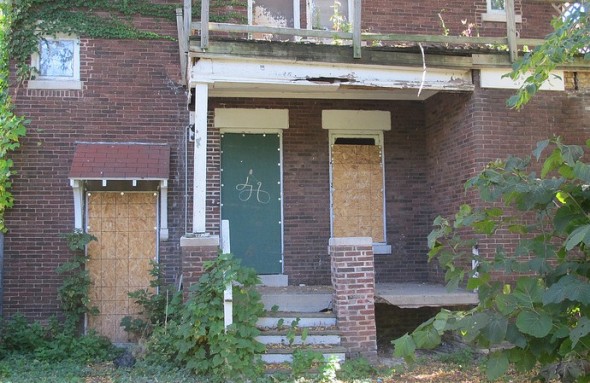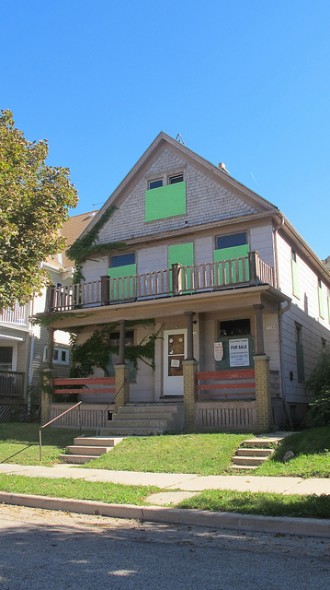Did U.S. Bank Discriminate Against City Neighborhoods?
Federal complaint includes evidence of bias in how bank handled homes in black and Latino neighborhoods.

Boarded-up houses drag down property values in Milwaukee neighborhoods. (Photo by Scottie Lee Meyers)
An evaluation of about three dozen foreclosed houses in Milwaukee has been added to the ongoing federal complaint against U.S. Bank. The complaint accuses the bank of discrimination based on how it allegedly maintains and markets foreclosed homes.
Filed with the U.S. Department of Housing and Urban Development, the complaint claims the bank is violating the federal Fair Housing Act.
“U.S. Bank’s actions have significant financial and health impacts on local governments, schools, neighborhoods and homeowners who live near these neglected properties,” said Shanna Smith, the president and CEO of the National Fair Housing Alliance, during a web presentation announcing the amended complaint.

Foreclosed houses that are not properly maintained are not just an eyesore, but also attract crime. (Photo by Scottie Lee Meyers)
The broadening of the case was based on a Metropolitan Milwaukee Fair Housing Council evaluation of 34 U.S. Bank properties in Milwaukee, 17 of which are in African-American neighborhoods, seven in Latino neighborhoods and one in a majority non-white neighborhood. The rest of the evaluated homes are in white neighborhoods.
More than half of U.S. Bank’s properties in neighborhoods of color had at least five deficiencies, which is twice as frequent than in white neighborhoods, said William Tisdale, president and CEO of the Metropolitan Milwaukee Fair Housing Council.
Tisdale said 16 percent of the homes evaluated by his organization in non-white neighborhoods had 10 or more deficiencies. No homes in white neighborhoods had that many deficiencies.
“Milwaukee is a city of well-maintained neighborhoods. Residents take pride in their communities. U.S. Bank is not a good neighbor,” said Tisdale, who showed several photos of blighted houses in Milwaukee during the web presentation.
“U.S. Bank is hurting Milwaukee’s African-American neighborhoods by allowing homes to have broken windows, overgrown shrubbery and an accumulation of trash,” he added.
The properties shown by Tisdale also lacked “For Sale” signs, suggesting the bank is skirting its responsibility to properly market the houses.
Nicole Garrison-Sprenger, a spokeswoman for the bank, called the claims inaccurate, saying U.S. Bank is only a trustee of the properties in question. The bank has no legal right to service or maintain properties that are held in an investment pool for which it is a trustee, she said in a statement.
“We share (National Fair Housing Alliance’s) concerns about abandoned and neglected properties and we fully support efforts to maintain the integrity of our communities,” she said.
Jeff Fleming, a spokesman for Mayor Tom Barrett, said U.S. Bank has been a “good partner in a variety of different ways in addressing the foreclosure issue in Milwaukee.”
“As banks go, they have certainly been in the top tier of partners in addressing some of the issues associated with the foreclosure crisis,” he added.
This story was originally published by Milwaukee Neighborhood News Service, where you can find other stories reporting on fifteen city neighborhoods in Milwaukee.
Political Contributions Tracker
Displaying political contributions between people mentioned in this story. Learn more.
- July 10, 2018 - Tom Barrett received $50 from Jeff Fleming
- September 14, 2017 - Tom Barrett received $35 from Jeff Fleming
- March 22, 2016 - Tom Barrett received $400 from Jeff Fleming
- August 29, 2015 - Tom Barrett received $100 from Jeff Fleming





















The race card has no limits. Broken windows and trash in an inner city neighborhood? Whhaaaaaat? Focus on selling homes in neighborhoods people want to….buy houses?
For me it comes down to, who is responsible for the property’s upkeep?
Many of these properties, as most home loans today, are part of mortgage-backed securities. That means that hundreds of home loans are put together & investors buy the right to receive the principal and interest payments from those home loans.
In steps a bank like U.S. Bank N.A., they get fees for acting on behalf of the owner/investor.
Now a homeowner, for whatever reason, doesn’t make payments and their home is foreclosed upon.
The owner/investor now owns the property.
A bank like U.S. Bank N.A., is responsible for maintaining/selling the property to recover value for the owner/investor.
The question is, why aren’t banks like U.S. Bank N.A. maintaining these properties? Obviously, it’s a money-losing scenario but they are breaking the law by not maintaining/securing these properties.
So, why is a bank like U.S. Bank N.A. allowed to break the law and apparently do it more in poor neighborhoods?